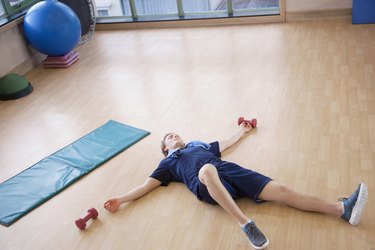
There are several reasons why you may feel faint immediately after exercise, particularly if the exercise is heavy. Although the symptoms occurring prior to passing out can be alarming, their underlying causes are generally not cause for concern. You can usually avoid the symptoms by making minor adjustments to your workouts. However, you should report these symptoms to your doctor so she can rule out rare, but potentially dangerous, underlying conditions.
Syncope
Video of the Day
Syncope, or fainting, occurs when regular blood flow to the brain is disrupted. Your brain needs blood for adequate function and to keep you conscious. If blood flow to the brain temporarily decreases, you may experience presyncope symptoms, the Cleveland Clinic explains. Depending on how long blood flow to the brain is impaired, you may lose consciousness, or faint. You will likely become alert again just a few seconds after fainting, but you may experience some confusion as your body and brain continue to adjust.
Video of the Day
Causes of Syncope Symptoms After Heavy Exercise
There are many situations that can precede a near-fainting episode. One situation particular to heavy exercise is dehydration. If you are losing more water through sweat than you are replenishing through drinking water or other fluids, this results in dehydration. Dehydration can result in a drop in your blood pressure, which can lead to lightheadedness, dizziness and fainting, the American Heart Association warns. Exercising in environments that are excessively hot or poorly ventilated is commonly associated with syncope, particularly when combined with dehydration.
Additional Causes and Considerations
Exercise, particularly high-intensity exercises, can lead to overexertion. Pacing your workout at a level of intensity that causes your heart to beat too fast can overload your cardiovascular system. Overexertion can also cause you to breathe abnormally — too quickly, for example. This is called hyperventilation, and it can lead to suboptimal amounts of important blood gases, such as oxygen and carbon dioxide. Therefore, hyperventilating can cause the symptoms that occur before you faint.
Intense or prolonged exercise can deplete your blood sugar level, resulting in hypoglycemia. Like the rest of your body, your brain needs sugar to operate normally. If your blood sugar drops to a level that results in a decrease of the brain's glucose supply, you will likely experience presyncope symptoms.
Presyncope Symptoms
What you are experiencing is likely what medical professionals refer to as presyncope — or before-fainting — symptoms. Because they are signs of a potential fainting episode, it is important to take precautions at the onset of symptoms to avoid suffering an injury in a fall. Common presyncope symptoms include feeling lightheaded and/or dizzy. You may become excessively pale and sweaty. Your vision and hearing may fade, and you may become nauseous. You may also feel a tingling sensation around your lips or in your fingertips, the Merck Manual reports. Whatever your symptoms, try to keep a log of them to report to your doctor, as he may ask you about these manifestations to help him make a diagnosis.